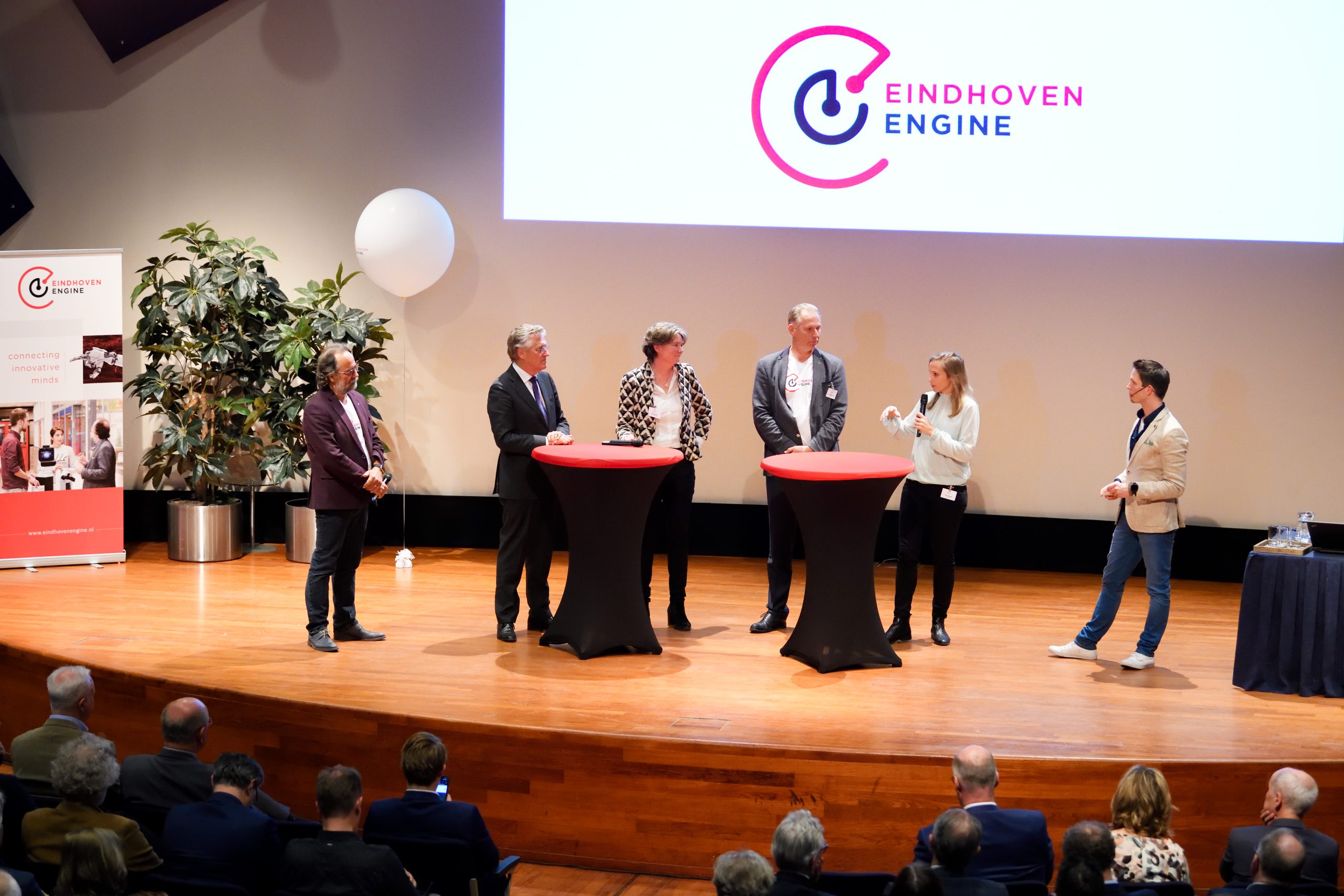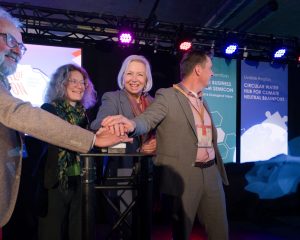Following the submission deadline of 4 June, a team of experts has examined the 11 projects submitted. Each of the projects was first assessed against formal criteria which had been published in advance and which set a high quality standard. Paul Merkus, coordinator of the OpenCall: “The text of the OpenCall 2020 was clear, which allowed the evaluation process to run smoothly and fairly. The team of experienced, independent experts was able to determine the ranking of the nine eligible proposals on the basis of these criteria. I’m proud of that.” Yesterday, the Advisory Board of Eindhoven Engine – with representatives from the knowledge institutions TU/e, TNO and Fontys and the business community – also gave a positive recommendation on the proposed selection of projects.
“In this time of the corona pandemic in particular, we see a great need for innovation. Companies and knowledge institutions have worked together intensively to come up with strong project proposals,” add directors Katja Pahnke and Maarten Steinbuch. “We therefore see a nice mix of diversity in the consortia. Eindhoven Engine is picking up more and more steam.” The projects are highly diverse in their focus: climate, vitality, health and smart manufacturing.
“Co-creation and co-location are the basic ingredients for unlocking collective intelligence in order to give a boost to innovation: this is Eindhoven Engine’s way of working. We look forward to the participating consortia soon becoming part of our ecosystem.”

Eindhoven Engine
Eindhoven Engine unlocks the collective intelligence in the Brainport region. Thanks to a unique formula, innovators from companies can join forces with students and experienced employees from knowledge institutions in order to work together to accelerate innovation and realize disruptive co-creation projects in which co-location is a prerequisite. The founding fathers of Eindhoven Engine are the knowledge institutions Fontys, TNO and Eindhoven University of Technology and the companies Philips Healthcare, Signify, ASML, VDL, NTS and NXP. Eindhoven Engine’s funds come from the Brainport Region Deal.
Background information on projects
For each of the projects, co-location at Eindhoven Engine is an attractive form of added value. Through this, Eindhoven Engine increases the chances of inspiring encounters. The Eindhoven Engine academy complements this with coaching and pioneering insights.
Carbyon
Humanity is facing an unprecedented challenge: global warming, driven by carbon dioxide (CO2) emissions from fossil sources such as oil and gas. However, these emissions, if captured, can be a renewable carbon source with applications such as crop growth and sustainable fuel synthesis. Carbyon will develop Direct Air Capture (DAC) technology to remove CO2 from the atmosphere and turn it into a green substitute to fossil fuels. As the global demand for renewable carbon will increase once the price level reaches €50 per ton of CO2, Carbyon is challenging multidisciplinary teams within Eindhoven Engine to collaboratively improve the main cost drivers of DAC technology.
Partners: Carbyon, DIFFER, TU/e
SmartMan
Smart Manufacturing (SmM) aims to improve factory efficiency by optimizing production processes, but SMEs often lack the capacity to create innovation in this domain. Bringing together Eindhoven Engine, Fontys, TNO and Brainport Industries Campus, the SmartMan project comprises research into various facets of SmM, including robot-assisted manufacturing, data sharing, industrial AI, virtual reality and autonomous transport. Student projects will be executed at SMEs with the goal of developing knowledge, technology and methods for combining quality, automation and flexibility in manufacturing. Success will be measured in terms of the economic value of improvements per project and company.
Partners: Fontys, TNO, Smart Industry Fieldlab Flexible Manufacturing partners, VDL, VBTI and several SMEs
ECoS-IAQ
Efficient Comfortable School Indoor Air Quality
Installations in buildings are responsible for around 35% of all energy consumption, approximately 20% of which is due to inefficient operations. Inferior environmental conditions within classrooms can have both short- and long-term health effects, mainly due to the presence of particulate matter. With greater insights into sensors, data interpretation, trend signaling, continuous monitoring, fault detection/diagnosis and predictive maintenance, problems can be identified in the Heating Ventilation Air Conditioning (HVAC) systems of schools. The ECoS-IAQ project focuses on the creation of product development concepts for air handling manufacturers, air filter manufacturers, control companies and installers.
Partners: Building G100, Camfil, ISSO, Kropman, Lucas Onderwijs, NedAir, TU/e
iHeat@Home
The iHeat@Home project contributes to a breakthrough innovation in thermal energy storage: a heat battery which is better, cheaper, smaller and greener than any competitor. This will accelerate the energy transition, promote the development of renewable energy sources, reduce grid investments and create new business. This is all happening here in the Brainport region. iHeat@Home focuses on solutions for real-time data on the heat battery’s state-of-charge and its optimal data management, with three coherent solutions: 1. The basis for a sensor which is robust and cheap; 2. Communication protocols and data management; 3. Integration in a validated, user-ready heat battery. The aim is to bring this technology to the market by 2023.
Partners: Caldic, Fontys, TNO, TU/e, Warmtebatterij BV
POWErFITTing
FITTing Persons’ vitality and optimizing their Work Environment
In an increasingly competitive global economy, physical inactivity and burnout rates are increasing. Sustainable employability based on good physical and mental health is therefore crucial, preventing absenteeism and also reducing healthcare costs. POWer FITTing optimizes the relationship between vitality and the (home) office environment through the combination of data acquisition, integration and application for the validation and acceleration of user-oriented solutions. By taking into account individual, societal and contextual factors, this enables employees to remain both healthy and productive. This benefits companies, individuals and wider society.
Partners: Fontys, HC Oranje-Rood, IMEC, TNO, TU/e
Wombath: towards an artificial womb
Following their birth, each child faces a physiological transition from mother-placental life support to (self-sufficient) life outside the womb. For some premature babies, this transition occurs too quickly. This places a heavy demand on the child’s immature vital organs, which is why extremely premature babies often experience serious, lifelong health problems with possible social consequences. As a trial in recent years, premature lambs have successfully been kept alive in a fluid-based environment, allowing them to develop in the same way as in the womb. The results are also promising for human application. The WOMBATH consortium will develop a medical device – an artificial womb – that supports the safe development of extremely premature babies outside of the womb. Ultimately, these infants will have better health prospects than premature infants with conventional care.
Partners: LifeTec Group, Máxima Medical Center, MEDSIM, NEMO Healthcare, POLIMI, RWTH Aachen, TU/e
